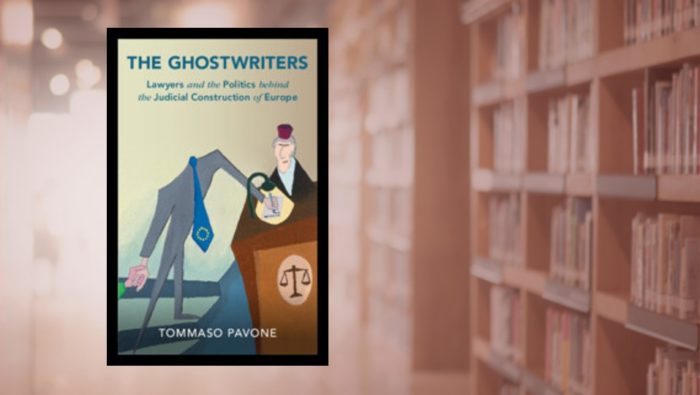
The Judicial Construction of Europe, from the Bar and the Bench

In a book entitled The Ghostwriters: Lawyers and the Politics behind the Judicial Construction of Europe, Tommaso Pavone contributes to an important stream of scholarship focused on the judicial construction of Europe since the early 1990s. In his book, Pavone presents a wealth of empirical material, drawing on several hundred interviews conducted in three countries (Italy, France and Germany), as well as the as yet unexploited archives of the European Court of Justice. This impressive dataset enables Pavone to provide a counterpoint to an important scholarly argument that has dominated this scholarship in the past few decades, the so-called “judicial empowerment thesis”.
The judicial empowerment thesis, according to Pavone, maintains that “domestic courts […] partnered with the ECJ and embraced European integration to bolster their own power” (p. 39). He highlights two limitations which, in his view, undermine the relevance of this argument: First, the judicial empowerment thesis exaggerates the ability of local judges, particularly at the lower-court level, to master the technicalities of EU law and to free themselves from the hierarchical grip of their respective supreme courts. Moreover, by focusing on the role played by judges, this thesis overstates the organic and unidirectional nature of the judicial construction of the European Union and overlooks the true agents driving this process.
In fact, the rich empirical material gleaned by the author shows that a generation of keen and energetic lawyers imbued with European ideals played an instrumental role in convincing lower courts to file preliminary references to the European Court of Justice. Some of these lawyers even engineered cases to push a pro-EU agenda that resulted in landmark rulings (e.g. Costa v. Enel). By casting light on agents of social change whom scholars have largely neglected to date, Pavone makes a significant contribution to the socio-legal scholarship on the construction of the European Union.
The book highlights the key role played by litigants and their representatives in the development of EU law – something that is accepted, and even explicitly mentioned, by certain proponents of the judicial empowerment thesis. For instance, in The Judicial Construction of Europe, Stone Sweet states that “[…] some private parties have an interest in using European law and court to subvert national regimes; national judges have the power to respond to these demands in various way and may pursue their own policy goals through their referral activities” (p. 104). Pavone provides empirical support for this claim, by showing that judges do not operate in a vacuum, but rather respond to the interests of lawyers who exercise their own agency.
The key question that is only briefly touched upon by the book is how the interests of these lawyers (whom Pavone calls the “ghostwriters” of EU law) intersect with those of local judges who do not hesitate to bypass judicial hierarchies when referring questions to the European Court of Justice. Indeed, unable to act alone, lawyers instead needed to find relays within the judicial branch in order to push their own agenda. Pavone rightly describes these lawyers as “interpretive mediators” who operate most effectively when they relate to certain social groups or individuals, while simultaneously maintaining sufficient distance from them. This reminds the reader of Venkatesh’s explanation in Off the Books for why the inhabitants of an underprivileged neighbourhood in Chicago perceived him as an appropriate mediator: “[…] I was neither white nor black, so I was not immediately identified with the police (white) or as a resident of the community (black) who might have a reason to monitor the behaviour of others in public space. My South Asian identity gave me an indeterminate and unthreatening presence, and I was known more for my status as a university student interested in the historical experiences of black Chicagoans” (emphasis added).
What made the ghostwriters’ presence “indeterminate and unthreatening” to the judges? The litigation strategies described by Pavone, such as cajoling the judges, cannot have possibly sufficed to convince them to forsake some of their powers. Did the ghostwriters draw on educational ties, membership in the same associations, ideological affinities or, more crudely, the fact that their organisational interests overlapped with those of judges (in which case the judicial empowerment thesis cannot be entirely wrong)? This important book will hopefully encourage further work in this exciting area of socio-legal research.

